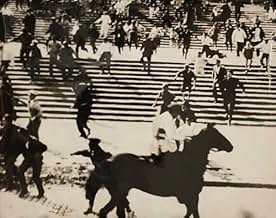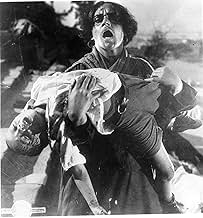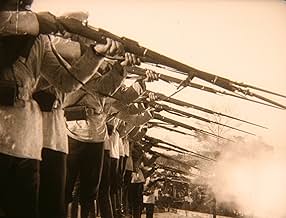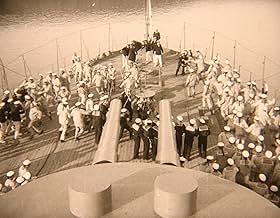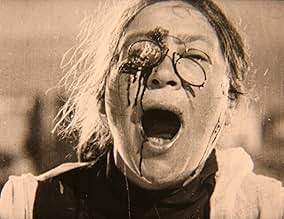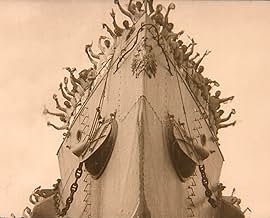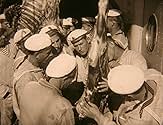IMDb RATING
7.9/10
64K
YOUR RATING
In the midst of the Russian Revolution of 1905, the crew of the battleship Potemkin mutiny against the brutal, tyrannical regime of the vessel's officers. The resulting street demonstration ... Read allIn the midst of the Russian Revolution of 1905, the crew of the battleship Potemkin mutiny against the brutal, tyrannical regime of the vessel's officers. The resulting street demonstration in Odessa brings on a police massacre.In the midst of the Russian Revolution of 1905, the crew of the battleship Potemkin mutiny against the brutal, tyrannical regime of the vessel's officers. The resulting street demonstration in Odessa brings on a police massacre.
- Awards
- 1 win total
Ivan Bobrov
- Young Sailor Flogged While Sleeping
- (as I. Bobrov)
Nina Poltavtseva
- Woman With Pince-nez
- (as N. Poltavtseva)
Iona Biy-Brodskiy
- Student
- (as Brodsky)
Sergei Eisenstein
- Odessa Citizen
- (as Sergei M. Eisenstein)
Andrey Fayt
- Recruit
- (as A. Fait)
Summary
Reviewers say 'Battleship Potemkin' is acclaimed for its pioneering montage and editing, significantly impacting cinema. The 1905 Russian Revolution portrayal, especially the Odessa Steps scene, is lauded for its potent visuals and emotional resonance. Many praise its technical innovations and contribution to filmmaking. However, some criticize its political propaganda and shallow character development. Nonetheless, 'Battleship Potemkin' is widely recognized as a cinematic masterpiece and a vital historical film.
Featured reviews
This classic is filled with vivid images that stay in your mind after you have watched it, and there is a lot to appreciate in the way that the key scenes were set up and photographed. The visuals are so impressive that the movie's imperfections are usually not so noticeable, and they don't keep it from being a memorable film.
The movie certainly deserves the praise that it gets both for the influence that it has had, and for some ideas that for the time were most creative. The famed 'Odessa Steps' sequence alone demonstrates both fine technical skill and a keen awareness of how to drive home an image to an audience. It deserves to be one of cinema's best remembered sequences. Some of the other scenes also demonstrate, to a lesser degree, the same kind of skill.
It says a lot for how effective all of the visuals are that so many viewers think so highly of "Battleship Potemkin" despite a story that is sometimes heavy-handed, and despite characters and acting that are both rather thin. These features might simply stem from the collectivist philosophy that lies behind the story, and they are obscured most of the time by Eisenstein's unsurpassed ability to present pictures that viewers will not forget.
Despite the flaws, this is a movie that most fans of silent films, and anyone interested in the history of movies, will want to see. There's nothing else in its era that's quite like it.
The movie certainly deserves the praise that it gets both for the influence that it has had, and for some ideas that for the time were most creative. The famed 'Odessa Steps' sequence alone demonstrates both fine technical skill and a keen awareness of how to drive home an image to an audience. It deserves to be one of cinema's best remembered sequences. Some of the other scenes also demonstrate, to a lesser degree, the same kind of skill.
It says a lot for how effective all of the visuals are that so many viewers think so highly of "Battleship Potemkin" despite a story that is sometimes heavy-handed, and despite characters and acting that are both rather thin. These features might simply stem from the collectivist philosophy that lies behind the story, and they are obscured most of the time by Eisenstein's unsurpassed ability to present pictures that viewers will not forget.
Despite the flaws, this is a movie that most fans of silent films, and anyone interested in the history of movies, will want to see. There's nothing else in its era that's quite like it.
There are only a handful of movies that were made on such a grand scale and made such a difference in the art of movie making.
"Bronenosets Potyomkin" is one of these movies, and it should be on anyone's list looking to learn more about the history of cinema.
Grigori Aleksandrov & Sergei M. Eisenstein directed this groundbreaking film that documents the horrors taking place on a Russian battleship. When the sailors finally retaliate against their superiors, the locals embrace the them, and support them. Things get ugly when a group of soldiers are sent to the small town to take care of business. What follows is one of the most imitated scenes in the history of cinema. Anyone who has seen "The Untouchables", and "Bronenosets Potyomkin" knows exactly what I mean.
Overall I think this movie raised the bar for film making just as "Intolerance" did a few years earlier. If you do not mind silent films, do yourself a favor, and see "Bronenosets Potyomkin".
If you don't like silent films..... watch "Bronenosets Potyomkin" anyway.
"Bronenosets Potyomkin" is one of these movies, and it should be on anyone's list looking to learn more about the history of cinema.
Grigori Aleksandrov & Sergei M. Eisenstein directed this groundbreaking film that documents the horrors taking place on a Russian battleship. When the sailors finally retaliate against their superiors, the locals embrace the them, and support them. Things get ugly when a group of soldiers are sent to the small town to take care of business. What follows is one of the most imitated scenes in the history of cinema. Anyone who has seen "The Untouchables", and "Bronenosets Potyomkin" knows exactly what I mean.
Overall I think this movie raised the bar for film making just as "Intolerance" did a few years earlier. If you do not mind silent films, do yourself a favor, and see "Bronenosets Potyomkin".
If you don't like silent films..... watch "Bronenosets Potyomkin" anyway.
An epic of the Russian revolution, Battleship Potemkin, perhaps not so correctly historically, addresses the Russian revolution of 1905. With memorable scenes, especially the flag and the staircase scenes, Russian cinema is perhaps not so shy about showing violence. Which ends up enhancing and giving a more shocking experience when watching the film. A great movie considering the time it was released.
If you're a film student, or were one, or are thinking of becoming one, the name Battleship Potemkin has or will have a resonance. Sergei Eistenstein, like other silent-film pioneers like Griffith (although Eisenstein's innovations are not as commonplace as Griffith's) and Murnau, has had such an impact on the history of cinema it's of course taken for granted. The reason I bring up the film student part is because at some point, whether you'd like it or not, your film professor 9 times out of 10 will show the "Odessa Stairs" sequence of this film. It's hard to say if it's even the 'best' part of the film's several sequences dealing with the (at the time current) times of the Russian revolution. But it does leave the most impact, and it can be seen in many films showcasing suspense, or just plain montage (The Untouchables' climax comes to mind).
Montage, which was not just Eistenstein's knack but also his life's blood early in his career, is often misused in the present cinema, or if not misused then in an improper context for the story. Sometimes montage is used now as just another device to get from point A to point B. Montage was something else for Eisenstein; he was trying to communicate in the most direct way that he could the urgency, the passion(s), and the ultimate tragedies that were in the Russian people at the time and place. Even if one doesn't see all of Eisenstein's narrative or traditional 'story' ideas to have much grounding (Kubrick has said this), one can't deny the power of seeing the ships arriving at the harbor, the people on the stairs, and the soldiers coming at them every which way with guns. Some may find it hard to believe this was done in the 20's; it has that power like the Passion of Joan of Arc to over-pass its time and remain in importance if only in terms of technique and emotion.
Of course, one could go on for books (which have been written hundreds of times over, not the least of which by Eisenstein himself). On the film in and of itself, Battleship Potemkin is really more like a dramatized newsreel than a specific story in a movie. The first segment is also one of the great sequences in film, as a mutiny is plotted against the Captain and other head-ups of a certain Ship. This is detailed almost in a manipulative way, but somehow extremely effective; montage is used here as well, but in spurts of energy that capture the eye. Other times Eisenstein is more content to just let the images speak for themselves, as the soldiers grow weary without food and water. He isn't one of those directors who will try to get all sides to the story; he is, of course, very much early 20th century Russian, but he is nothing else but honest with how he sees his themes and style, and that is what wins over in the end.
Some may want to check it outside of film-school, as the 'Stairs' sequence is like one of those landmarks of severe tragedy on film, displaying the ugly side of revolution. Eisenstein may not be one of the more 'accessible' silent-film directors, but if montage, detail in the frame, non-actors, and Bolshevik themes are your cup of tea, it's truly one of the must sees of a lifetime.
Montage, which was not just Eistenstein's knack but also his life's blood early in his career, is often misused in the present cinema, or if not misused then in an improper context for the story. Sometimes montage is used now as just another device to get from point A to point B. Montage was something else for Eisenstein; he was trying to communicate in the most direct way that he could the urgency, the passion(s), and the ultimate tragedies that were in the Russian people at the time and place. Even if one doesn't see all of Eisenstein's narrative or traditional 'story' ideas to have much grounding (Kubrick has said this), one can't deny the power of seeing the ships arriving at the harbor, the people on the stairs, and the soldiers coming at them every which way with guns. Some may find it hard to believe this was done in the 20's; it has that power like the Passion of Joan of Arc to over-pass its time and remain in importance if only in terms of technique and emotion.
Of course, one could go on for books (which have been written hundreds of times over, not the least of which by Eisenstein himself). On the film in and of itself, Battleship Potemkin is really more like a dramatized newsreel than a specific story in a movie. The first segment is also one of the great sequences in film, as a mutiny is plotted against the Captain and other head-ups of a certain Ship. This is detailed almost in a manipulative way, but somehow extremely effective; montage is used here as well, but in spurts of energy that capture the eye. Other times Eisenstein is more content to just let the images speak for themselves, as the soldiers grow weary without food and water. He isn't one of those directors who will try to get all sides to the story; he is, of course, very much early 20th century Russian, but he is nothing else but honest with how he sees his themes and style, and that is what wins over in the end.
Some may want to check it outside of film-school, as the 'Stairs' sequence is like one of those landmarks of severe tragedy on film, displaying the ugly side of revolution. Eisenstein may not be one of the more 'accessible' silent-film directors, but if montage, detail in the frame, non-actors, and Bolshevik themes are your cup of tea, it's truly one of the must sees of a lifetime.
With workers striking in Russia, the crew of the battleship Potemkin feel a certain kinship for the plight of their brothers. When they are served rotting, maggot infested meat some of the crew object, only to find themselves singled out and placed in front of a firing squad. With the marines seconds away from firing the deadly shots, ordinary seaman Grigory Vakulinchuk steps into the breach and intervenes to save the men by appealing to the firing squad to ignore their orders. When the officers take their revenge and kill Vakulinchuk, all are bonded together in the struggle; a bond that reaches to the city of Odessa where the rebellion grows, leading to a bloody and historic series of events.
It is hard to imagine that anybody who has seen quite a few films in the past few decades would be unaware of this film, but it is perhaps understandable that fewer have had the opportunity to actually sit down and watch. I had never seen this film before but had seen countless references to it in other films and therefore considering it an important film to at least see once. The story is based on real events and this only serves to make it more interesting but even without this context it is still an engaging story. The story doesn't have much in the way of characters but it still brings out the brutality and injustice of events and it is in this that it hooked me surprisingly violent (implied more than modern gore) it demonising the actions and shows innocents falling at all sides in key scenes. The version I saw apparently had the original score (I'm not being snobby modern rescores could be better for all I know) and I felt it worked very well to match and improve the film's mood; dramatic, gentle or exciting, it all works very well.
The feel of the film was a surprise to me because it stood up very well viewed with my modern eyes. At one or two points the model work was very clearly model work but mostly the film is technically impressive. The masses of extras, use of ships and cities and just the way it captures such well organised chaos are all very impressive and would be even done today. What is more impressive with time though is how the film has a very strong and very clean style to it it is not as gritty and flat as many silent films of the period that I have seen; instead it is very crisp and feels very, very professional. Of course watching it in 2004 gives me the benefit of hindsight where I can look back over many films that have referenced the images or directors who have mentioned the film in interviews; but even without this 20:20 vision it is still possible to see how well done the film is and to note how memorable much of it is the steps and the firing squad scenes are two very impressive moments that are very memorable. The only real thing that might bug modern audiences is the acting; it isn't bad but silent acting is very different from acting with sound. Here the actors all over act and rely on their bodies to do much of their delivery word cards just don't do the emotional job so they have to make extra effort to deliver this.
Overall this is a classic film that has influenced many modern directors. The story is engaging and well worth hearing; the directing is crisp and professional, producing many scenes that linger in the memory; the music works to deliver the emotional edge that modern audiences would normally rely on acting and dialogue to deliver and the whole film is over all too quickly! An essential piece of cinema for those that claim to love the media but also a cracking good film in its own right.
It is hard to imagine that anybody who has seen quite a few films in the past few decades would be unaware of this film, but it is perhaps understandable that fewer have had the opportunity to actually sit down and watch. I had never seen this film before but had seen countless references to it in other films and therefore considering it an important film to at least see once. The story is based on real events and this only serves to make it more interesting but even without this context it is still an engaging story. The story doesn't have much in the way of characters but it still brings out the brutality and injustice of events and it is in this that it hooked me surprisingly violent (implied more than modern gore) it demonising the actions and shows innocents falling at all sides in key scenes. The version I saw apparently had the original score (I'm not being snobby modern rescores could be better for all I know) and I felt it worked very well to match and improve the film's mood; dramatic, gentle or exciting, it all works very well.
The feel of the film was a surprise to me because it stood up very well viewed with my modern eyes. At one or two points the model work was very clearly model work but mostly the film is technically impressive. The masses of extras, use of ships and cities and just the way it captures such well organised chaos are all very impressive and would be even done today. What is more impressive with time though is how the film has a very strong and very clean style to it it is not as gritty and flat as many silent films of the period that I have seen; instead it is very crisp and feels very, very professional. Of course watching it in 2004 gives me the benefit of hindsight where I can look back over many films that have referenced the images or directors who have mentioned the film in interviews; but even without this 20:20 vision it is still possible to see how well done the film is and to note how memorable much of it is the steps and the firing squad scenes are two very impressive moments that are very memorable. The only real thing that might bug modern audiences is the acting; it isn't bad but silent acting is very different from acting with sound. Here the actors all over act and rely on their bodies to do much of their delivery word cards just don't do the emotional job so they have to make extra effort to deliver this.
Overall this is a classic film that has influenced many modern directors. The story is engaging and well worth hearing; the directing is crisp and professional, producing many scenes that linger in the memory; the music works to deliver the emotional edge that modern audiences would normally rely on acting and dialogue to deliver and the whole film is over all too quickly! An essential piece of cinema for those that claim to love the media but also a cracking good film in its own right.
Did you know
- TriviaThe film censorship boards of several countries felt this movie would spread communism. France imposed a ban after a brief run in 1925; it lifted it in 1953 after the death of Russian leader Joseph Stalin. The UK banned it until 1954.
- GoofsIn the Imperial squadron near the end of the film, there are close-ups of triple gun turrets of Gangut-class dreadnought. It possibly was made this way to show the power of Imperial fleet, but battleships of 1905 were much smaller pre-dreadnoughts, with twin turrets only, just like "Potemkin". "Ganguts" entered service in 1914.
- Alternate versionsSergei Eisenstein's premiere version opened with an unattributed quote from Leon Trotsky's "1905": The spirit of mutiny swept the land. A tremendous, mysterious process was taking place in countless hearts: the individual personality became dissolved in the mass, and the mass itself became dissolved in the revolutionary impetus. This quote was removed by Soviet censors in 1934, and replaced by a quotation from V.I. Lenin's "Revolutionary Days": Revolution is war. Of all the wars known in history, it is the only lawful, rightful, just and truly great war...In Russia this war has been declared and won. The original text was restored in 2004.
- ConnectionsEdited into Seeds of Freedom (1943)
- How long is Battleship Potemkin?Powered by Alexa
Details
- Release date
- Country of origin
- Languages
- Also known as
- Potemkin
- Filming locations
- Sevastopol, Crimea, Ukraine(battleship scenes)
- Production company
- See more company credits at IMDbPro
Box office
- Gross US & Canada
- $51,198
- Opening weekend US & Canada
- $5,641
- Jan 16, 2011
- Gross worldwide
- $62,723
- Runtime
- 1h 6m(66 min)
- Color
- Sound mix
- Aspect ratio
- 1.33 : 1
Contribute to this page
Suggest an edit or add missing content


